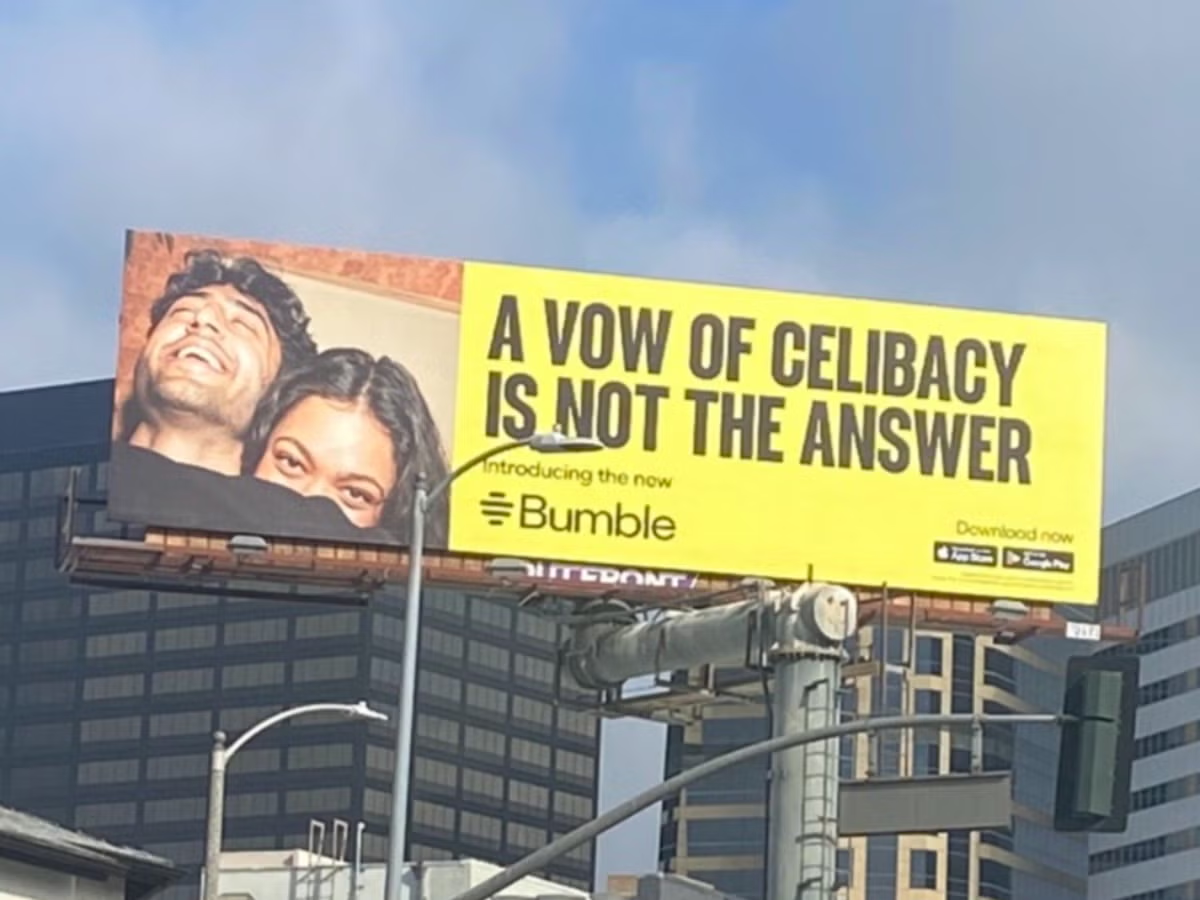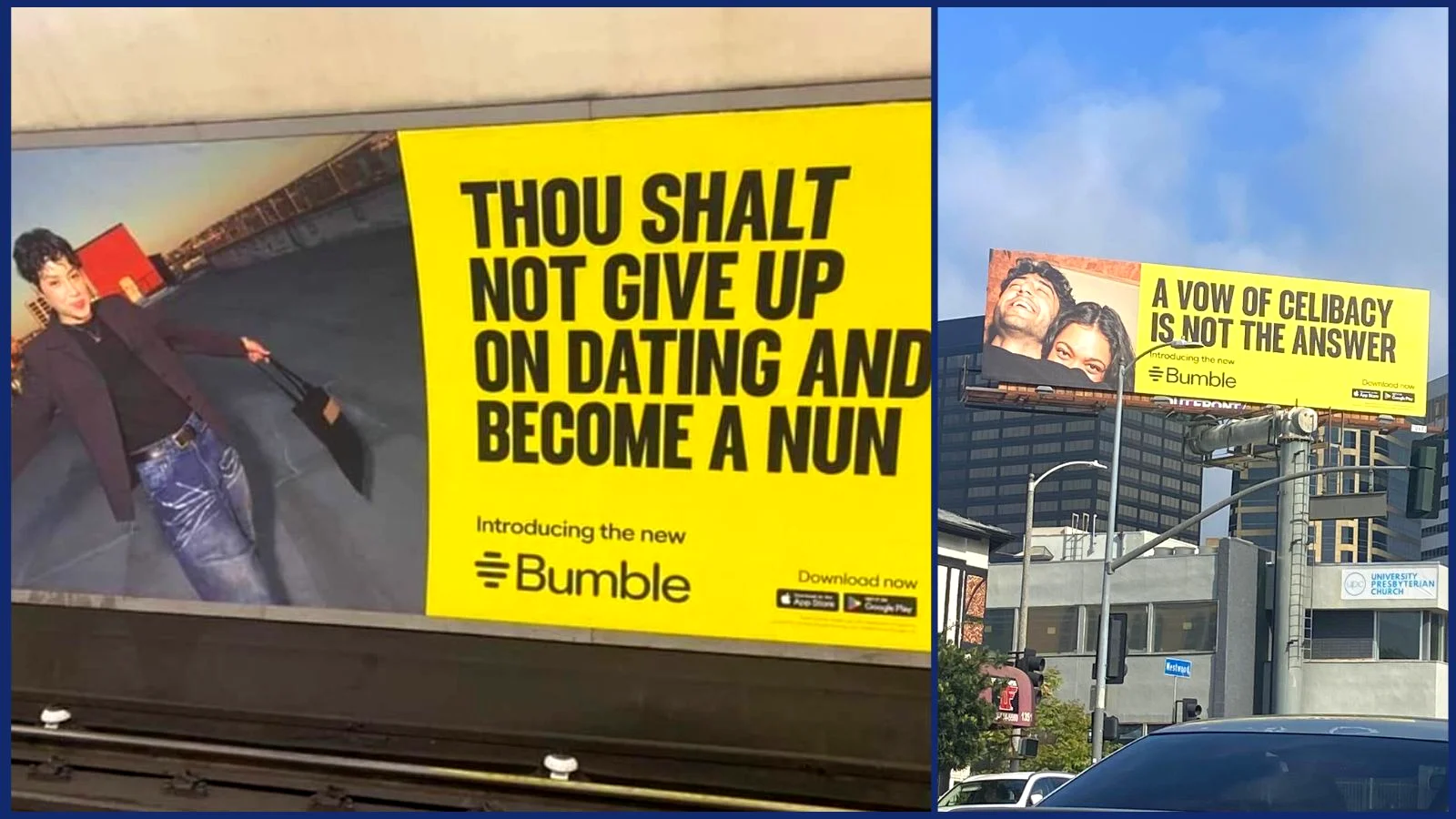In a recent move that has captured significant public attention, Bumble has decided to withdraw its controversial celibacy advertisements. These ads, which were a part of the dating app’s latest global campaign, have sparked a wave of outrage on social media, prompting the company to reassess its messaging strategy.

The Campaign That Stirred the Pot
Bumble, a dating platform that prides itself on prioritizing women’s choices, found itself at the center of a heated debate due to its billboards placed across various U.S. locations. One such billboard in California starkly proclaimed, “You know full well a vow of celibacy is not the answer,” while another echoed a similar sentiment. This bold stance on celibacy was intended to resonate with the common frustrations associated with dating, but instead, it ignited a backlash among users and the broader public.
For four billion years celibacy was not the answer for your ancestors- so yeah, you should have sex and reproduce. Great ad @bumble. pic.twitter.com/UQLF5DD85f
— Dick Lucas – e/acc (@dickclucas) May 15, 2024
Public Reaction and Bumble’s Response
The reaction on social media was swift and unforgiving, with many calling the ads offensive and demeaning, particularly to women who choose to abstain from sex for personal reasons. Addressing the controversy, a Bumble spokesperson explained to TheStreet that the language used in the ads was meant to address the frustrations of dating. The spokesperson stated, “Women’s experiences are at the center of what we do at Bumble. This was not our intention and we are in the process of removing it from our marketing campaign, and will continue to listen to the feedback from our members.”

Leadership Changes and New Directions
The timing of this controversy coincides with significant shifts within Bumble’s leadership, with CEO Lidiane Jones taking the helm in January 2024. Under her guidance, the company is navigating through a challenging phase, marked by a reported net loss of $32 million in the first quarter of the year. This financial downturn is accompanied by a noticeable shift in user behavior, with a significant portion of younger demographics preferring in-person interactions over online dating.
In response to these trends, Bumble has introduced a new feature called “Opening Moves,” which breaks away from the app’s traditional requirement for women to initiate conversations. This feature is part of Bumble’s broader effort to adapt and evolve in a changing market, reflecting an acknowledgment of generational differences in dating preferences.
A Bold, Yet Rocky Campaign
Bumble’s latest campaign, according to Bumble Chief Marketing Officer Selby Drummond, was intended to be a “fun, bold approach in celebrating the first chapter of our app’s evolution.” However, the inclusion of messages against celibacy has, perhaps inadvertently, overshadowed the campaign’s core objectives.

As Bumble retracts these ads and recalibrates its promotional strategies, the incident serves as a poignant reminder of the delicate balance brands must maintain when addressing sensitive and personal topics. Bumble’s experience underscores the importance of aligning marketing messages with the diverse values and preferences of a global audience, ensuring that efforts to resonate do not backfire.
Looking Ahead
Moving forward, Bumble’s challenge will be to rebuild trust where it’s been eroded and fine-tune its messaging to better reflect the values of its user base. As the company continues to evolve, it remains to be seen how it will integrate user feedback into its marketing strategies and whether it can successfully navigate the complex landscape of online dating in an increasingly digital age.










